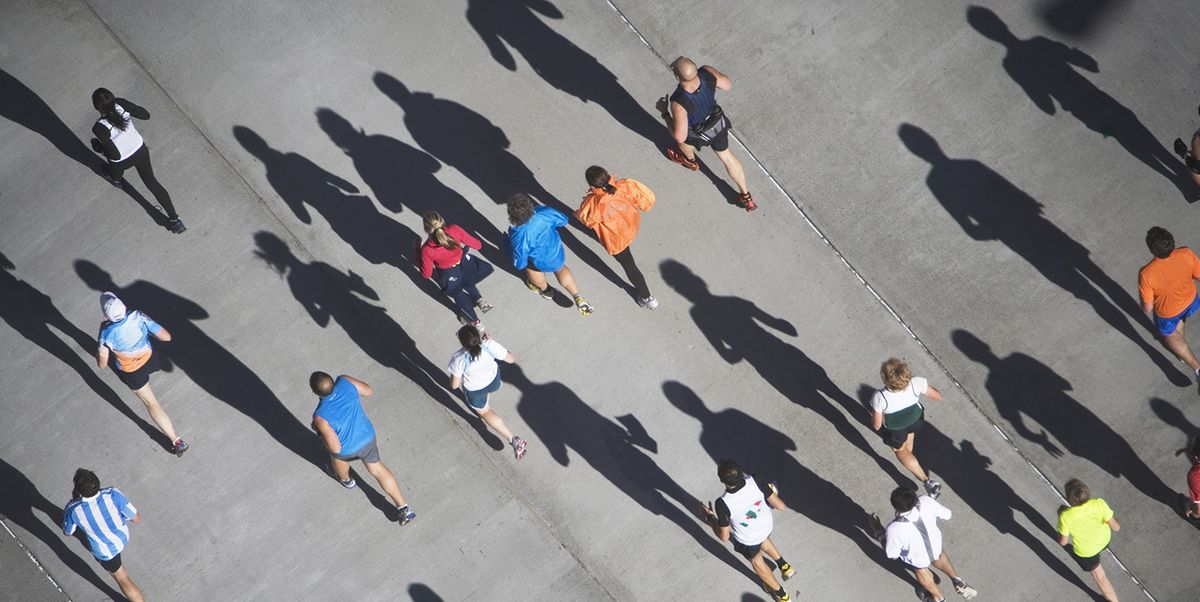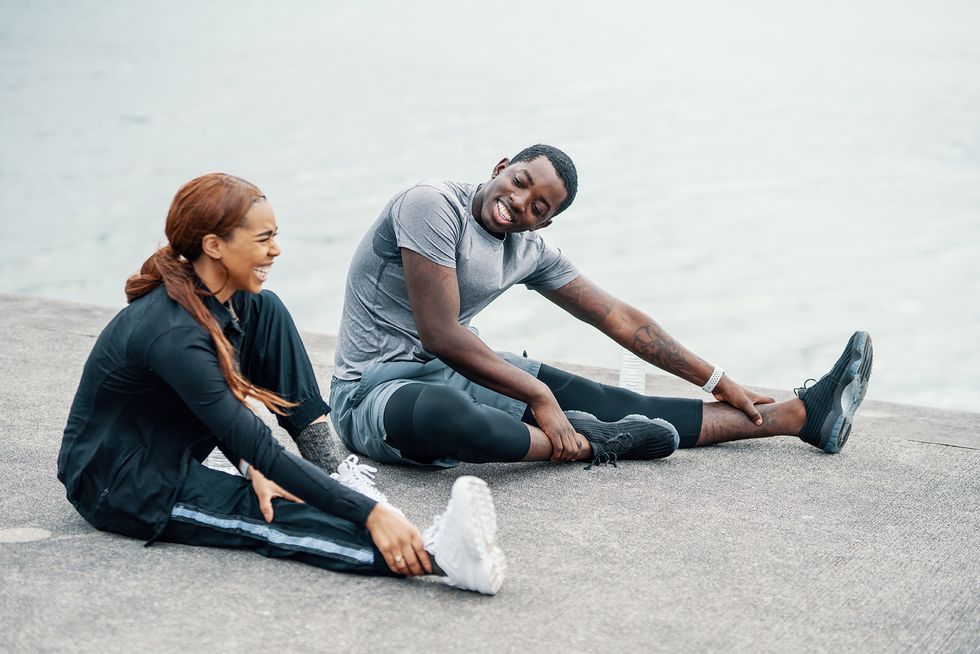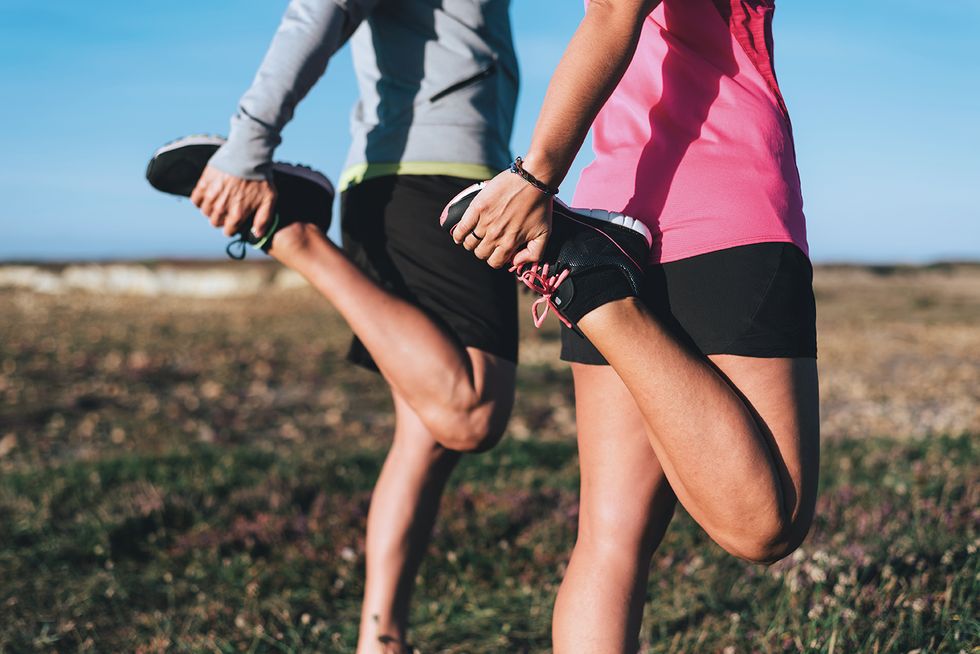Products You May Like
It’s 7:30 A.M. on a Monday morning in San Francisco, and Ellie Gerson, a runner and content creator, just completed a scenic seven-mile run in the Marina District. She immediately opens Strava to upload her workout, along with a cute selfie and a relatable caption about the highs and lows of training for the Chicago Marathon, and the kudos from her followers start rolling in. Gerson is one of roughly 100 million athletes who regularly use the app to record and share their exercises, from running to cycling, swimming, and more.
For the uninitiated, Strava is known primarily for its tracking capabilities, but it ultimately fosters a supportive community through photo sharing, commenting, and “liking,” a.k.a. “giving kudos.” There is an inclusive ethos embedded within its parameters where every activity counts, whether you’re an ultra-athlete or simply training for your first 5K. According to Tyler Swartz, a Strava ambassador, runner, and the founder of Endorphins, a 3,000-member running club in New York City, Philadelphia, Boston, Chicago, and Washington, D.C., “If you’re getting kudos, those people care. That is your support system, and when you’re able to get support from a person of interest, it feels much more special than a like on Instagram, because it’s a more intimate community.” On the surface, all of Strava’s features appear very standard for a community-building app—that is, until a potential suitor starts following you.
There’s no doubt that dating is difficult, especially in 2023. Ever since the advent of Tinder over a decade ago, dating apps have held the promise of a convenient and boundless way to search for a partner, but a growing sentiment among singles suggests that they may have lost their luster. Nowadays, apps are gatekeeping meeting “The One” behind premium subscriptions, and users are experiencing decision fatigue over the paradox of choice; it’s difficult to not feel disheartened in the interminable quest to find love.
Part of the issue is there is so much pressure to translate those endless swipes and matches from the dreaded texting preamble stage to something offline. Serena Kerrigan, a self-proclaimed dating expert and influencer from New York City whose platform is centered on inspiring confidence and giving people the tools to form meaningful connections, thinks the idea of meeting on a dating app has become taboo. “It’s cringe now,” she says. “The great thing about apps is that they connect you to different people in ways you probably couldn’t before, but I think they were a very pandemic-heavy thing.” Kerrigan started branding herself in the height of COVID-19 through a “Let’s Fucking Date” Instagram Live series she recorded in her living room. Connecting “became so dependent on apps and technology and relying on that to go on dates, that now there’s a big rejection of it,” she adds.
Indeed, there are dating apps for just about every segment of the population now, including Grindr for the LGBTQ+ community, Jdate for Jewish singles, Christian Mingle for the Christian ones, and Feeld, for those interested in ethical non-monogamy and alternative relationship structures. If the more specific the way to meet someone the better, it makes sense that singles are seeking out other community apps centered around their passions—apps that aren’t even necessarily engineered around romance—in order to find a crush.
Running saw a boom during the pandemic years as gyms and studios were closed, and it was an easy (and cost-effective) way to work out safely. In particular, Gen Z’s newfound interest in the activity can not only be attributed to the generation’s ongoing focus on general health, fitness, and self-care, but also the social aspect that is being created and amplified on apps like Instagram and TikTok. In fact, on the latter alone, the hashtag #runtok has over 2.4 billion views and #marathontraining has over 1.3 billion views. Before runners start turning their miles into content, they first download Strava to keep track. Delaney Dowdell, a marathon runner in Boston whose Strava bio reads “using this app as if my life depends on it,” says, “Anyone who has Strava isn’t just someone on the street who downloads the app because all their friends are using [it]. When you download Strava, you usually have something you are going to start sharing on there.”
Due to the intimacy of sharing workouts and the privacy needed to publicize a route, especially one close to home, users tend to have far fewer followers on Strava compared to other social media apps, which consequently allows them the space to showcase more of their personality. When asked if she has ever posted on Strava with hopes of someone, perhaps a crush, seeing it, Gerson said, “One thousand percent. Whether it was a long run or I’m in a cute outfit, there have definitely been times where I’ve thought, he will see this.”
The ability to post photos and show support through comments and kudos can serve as the ultimate tools to connect with someone who harbors similar interests. “I think people are more comfortable putting themselves out there [on Strava] because they have that first inkling that this is someone who understands their lifestyle,” Dowdell says. Kerrigan, who does not identify as a runner, thinks people are finding, or at least searching for, romantic connections on Strava because there is a buffer. “Dating apps are almost too on-the-nose,” she says. “It’s too much pressure. You feel like [dating] is a job interview and the job is my husband. [Strava] is a running app. People want to have an excuse to engage and something to talk about.”
Brynn Pelletier, a runner and TikToker in Philadelphia, hosts an interview-style series called “Dating on The Run,” where she runs with single guys looking to date and facilitates small talk, because she also finds “dating apps and other forms of social media to be extremely surface-level, which makes it difficult to see who an individual is, how they act, and even what their voice sounds like.” She then posts their Instagram handle so people can message them if they are interested.
However, many users are divided over the fact that the app currently has no private or direct messaging function. While some believe that Strava should stick to its original intentions of recording activities, others yearn for the capability to reach out directly so they can further a dialogue or explore a missed connection on a route. “After group runs, I see a lot of people asking, ‘What’s your Strava?’” Swartz says. “Having multiple touchpoints with someone is a great way to build trust and confidence. People might meet at a group run and not see each other for three to four weeks but are on each other’s radar, because they can view each other’s activities on Strava. They are able to feel like they are much more closely connected to one another than they truly are after having only met once.” Seeing as Strava notifies you each time a follower comments or throws you kudos, it’s easy to surmise who might (or might not) be interested. Yet even with subtle flirting online, some serious runners aren’t even necessarily craving a partner—they simply just want to be seen. Dowdell mentions that one of her biggest struggles with dating while training for the upcoming New York City Marathon is her schedule: She goes to bed by 10 P.M. and is up around 5 A.M. to get her run in, so she doesn’t have a ton of availability, let alone energy, to go on dates.
If the allure of face-to-face interactions is sparking a renewed interest in finding love offline, it begs the question: where is the best place to meet quality singles? Like a moth to a flame, runners seem to love working out by the water. From the esplanade along the Charles River in Boston to the Miami Beach Boardwalk, runners flock to these long stretches by the river and ocean to get their miles in. “The way you can romanticize your run is different than if you are just going for a run through a neighborhood or a park,” says Hannah Gerson, a runner, content creator, and account executive at a New York City-based software company. “You can just stare off [into space], and it’s a little more dramatic.”
The ultimate route seems to be New York City’s West Side Highway. In fact, Kerrigan created a dedicated Instagram account, @clubwsh, after dubbing the running path “New York’s hottest club.” She remembers being blown away by how many attractive people there were sprinting up and down the five-mile stretch—not to mention how inclusive the environment is. “There is a lot of exclusivity in New York, but the West Side Highway is free,” she says. “Anyone can go.” Ahead of Marathon Sunday, the #westsidehighway hashtag has over 18.4 million views on TikTok (and counting). The best times to run into someone, so to speak, tends to be before or after work, where there is the highest concentration of people from the surrounding Chelsea, West Village, and Financial District neighborhoods. “Everyone is young, everyone is attractive, everyone is in great shape,” Gerson says. “It’s overstimulating, but it’s also really fun.”
Dating apps will no doubt continue to play a role in the dating world, but there has been a welcome shift toward seeking more targeted connections outside of them in hopes of forging more organic and meaningful relationships. By embracing personal interests and tapping into communities both on and offline, singles are hoping to rediscover the magic of connection and forge deeper bonds beyond the confines of the virtual realm—and maybe even find a new workout buddy.

Originally from Southern California, Kelsey Borovinsky moved to the East Coast to attend Boston University before settling in New York City after graduation. Currently, she is a strategist at The Infatuation, where she focuses on audience growth. Her writing has appeared in New York Magazine, Bon Appétit, Architectural Digest, Teen Vogue, Travel + Leisure, among other publications.



